 INDUSTRY INDUSTRY |
A preliminary analysis of the Romanian industry statistics will show that the industrial output has been steadily declining for the past 10 years. When confronted with the question of why is that so, Mr. Radu Berceanu, Ministry of Industry, Energy and Trade, pointed out that this decline is a natural process. During the Communist Regime Romania was a heavily industrialized country with a strongly centralized economy. "We used to produce different kinds of industrial goods destined to the COMECON. That was a special market with special arrangements for payments which were decided by some political leaders, not by the market" explains Mr. Berceanu, "Because of that, our heritage in the industrial field was very inappropriate for the market economy of the Europe of today". In fact, after the fall of communism traditional markets collapsed and most companies were not ready to compete with western ones.
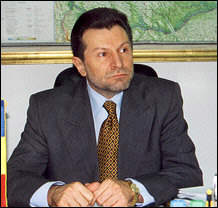
By 1989 Romania had paid in full its foreign debt. However, that resolution taken by the former communist leader, Ceausescu, resulted in the cessation of all imports. Consequently, and as a corollary no more new technology was brought into the country. By the time Communism fell most factories were totally obsolete and in desperate need of repairs. After repeated attempts by previous governments to sell the companies in the state they were, the government finally realized that foreign companies would not buy local companies without a previous restructuring process. "The new owners do not dare to kick out many of the employees since they are afraid of strikes and that sort of thing. Usually they ask for the restructuring to be made by the Romanian authorities, and only then they start negotiations for buying the company" concludes Mr. Berceanu. At this date many companies have been sold and those that have not yet been put out for sale are undergoing serious restructuring processes.
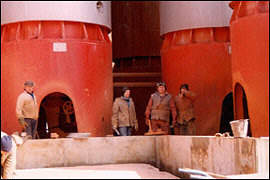
A number of foreign companies that have seen the excellent possibilities this market have purchased local companies and have not regretted it, rather the opposite. Such is the case the Balli Group. The British based Group specialized in the trade of steel and non-ferrous minerals has, since its arrival to Romania, built a little emporium. They first started with the purchase of Convex, a bulk-handling terminal in the Port of Constanza. Then they continued with a bank (Robank) and an insurance company (Asigurarea Anglo-Romana). But the jewel in the crown is BBG Alum, the largest alumina producer in Romania.
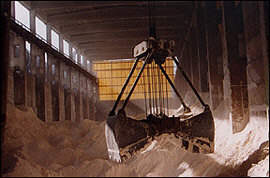
Prior to be overtaken by the Balli Group, BBG Alum was in a rather bad financial shape. Production in 1997 was down to 142,300 tons of alumina per year. From May 1999 till the end of 2000 the Balli Group will have invested US$ 17.4 million in the modernization of the plant. The results are spectacular. Production increased to 277,000 tons in 1999, and no less than 550,000 tons are projected for the end of 2000. Costs have been reduced and an IT center has been set up to back up operations. The plant has been totally reoriented toward exports. Today 50% of their production is destined abroad. In fact all their production is sold before hand. In mid 2000 BBG Alum will purchase the port of Tulcea in the Danube, where they are located, gaining access to the Black sea, thus allowing them to reduce transport costs and to export anywhere in the world. This is part of a vertical integration policy. BBG Alum has its eyes set in the major alumina smelter in Romania, Alro Slatina. However they will have to wait until the government decides to privatize them. For the time being BBG Alum is concentrating in expanding and diversifying its production. They have already found a niche in specialized alumina, a highly demanded product sold much higher prices with relative low production costs.
As Mr. Dr. Shams Houshang, President of BBG Alum and the brain behind the change put it " pouring money alone into the country does not resolve any problem. Unless you create the human infrastructure, the right organization, the right management and you motivate the people, you cannot successfully help the economy of the host country". That is why Dr. Shams has emphasized the reeducation of the labor, motivating them through salary increases and team work. Probably the most dramatic change he has implemented is the shift from a vertical command structure into a set-up of interactive teams. And the workers seem to be responding. "We have to learn the concept of teamwork in a culture adaptable to the Romanian cultural background. We in BBG have started this transformation, which is the biggest challenge for Romania and for any company that wants to operate in Romania", concludes Dr. Shams.
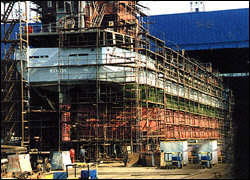 | The Duch group Damen understood this principle very well when they finally acquired Shipyards Galati in 1999. However instead of substituting the management, Damen retained the existing one and left them free hand to operate. Mr. Ion Mocanu, General Director of Damen Shipyards Galati explains that he had been preparing the privatization since 1994. "When I say preparation I mean the preparation of the employees to understand, accept and finally make them want this privatization". This was no easy task. As he underscores "the passing from Union management to a performing management is indeed a very tough process. For me it meant almost four years of weekly dialogue with the Unions. There was a fear of privatization because the buyer imposed a certain quality of performance. He did not buy to insure social protection for the entire community".
Photo 6.5 . Mr. Ion Mocanu, General Director of Damen Shipyards Galati
Mr. Mocanu not only managed to change the mentality of the workers, he also successfully reduced the work force from 9,400 in 1990 to 4,100 in 2000 without any social unrest. On top of it, he successfully managed to increase production and reduce costs. 3 years ago the execution of 1 ton of steel was done in 280 hours. That same ton is down today to 130 hours. The shipyards, specialized in the construction of any kind of cargo vessel - from river barges to 65,000 petroleum tanks - have also focused in exports. 60% of their production are orders from Damen. The remaining 60% go to other markets, from Norway or France to Greece and China. They keep securing orders from international buyers, and their headquarters in Holland keep them busy with the production of boats for stock. No wonder their turnover will double from 1999 to 2000.
ABB and Alstom, present in this market since 1992, are some of the earliest investors in Romania. "Despite of all the existing difficulties existing at that time in Romania ABB and Alstom had the courage to invest here" stresses Mr. Emilian Dobrescu, General Manager of Alstom Power. Up to this day their combined investments amount US$ 40 million but, as Mr. Dobrescu says, all their systems and processes are very complicated, time consuming and do not yield benefits as fast as consumer goods. However, "they succeeded and they are very satisfied of the accomplishments".
Their main goal was to bring in new projects and to develop and modernize the Romanian power system. Today they manufacture and provide equipment for power generation, a field in perpetual evolution in Romania. Mr. Dobrescu specifies that the Romanian plant has multiplied its revenues by 5. They originally supplied only to the local market, but they soon started exporting to markets as sophisticated as Sweden, Switzerland, Germany or the USA. Today they are present in five continents. "We are accepted everywhere around the world, having the same standards as each of our companies from the West. This was not easy to achieve" proudly remarks Mr. Dobrescu. "Now we not only have a strong position on the local market, but in fact, we are leading it".
A local success story is Arctic. This refrigerator company has been present in western markets since 1975, well before the 1989 Revolution. "Arctic and its executive management have always been in a continuous relationship with the competitive and free market in Western Europe" clarifies Mr. Traian Novolan, Executive General Director of Arctic, "so the market economy was not anything new for us. The passage from the super-centralized economy in Romania to the competitive market economy did not make our company collapse".
Not only Arctic did not collapse, but it has not stopped growing. 70% of its production is sold to England, France and Germany, and the local market is ever expanding. In 1997, 51% of Arctic's shares were purchased by the EBRD, injecting the company with a new influx of fresh capital (US$ 20 million) to invest in new technologies and to continue widening its product line.
However, Arctic remains very small when compared to the rest of European manufacturers of white products. Actually, companies such as Whirlpool or Electrolux have been consistently purchasing white good plants in Eastern and Central Europe. It would be very difficult for Arctic to stand alone, but that does not seem to worry them now. On the contrary, during their presentation at Confortec fair in Paris, they not only signed contracts for their new lines, but the large producers showed a keen interest in Arctic.
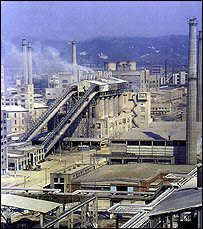
Large companies in Romania yet remain to be privatized. Uzinele Sodice Govora (USG) is one of them. A 40 year old factory, USG is the largest manufacturer of soda products in Romania and one of the largest ones in Central Europe. It literally sits on piles of tis raw materials, limestone and salt, conceding them a comparative advantage vis-a-vis their competitors. Despite all of this, according to its General Manager, Mr. Grigore Balintescu, it is not easy to be privatized. "We had a privatization attempt in 1997 with an American Company. However, these talks did not come to an end because that company merged with another one", he explains. "Now we are on the list with 4 other Romanian companies that are going to be privatized by the World Bank".
USG is doing the restructuring process on its own. It has decreased its personnel from 3,600 in 1993 to 1,400 in 2000 while offering training courses to the workers. Production has been lowered to 40% of its capacity, and non-competitive lines such as soda-ash have been eliminated, concentrating on the production of dense soda ash and expanding to new lines such as detergents. Commercial and marketing departments have been created to adapt to a more competitive market. But despite these changes the renovation of the plant is no easy task. More resources are needed to modernize the plant and to purchase new technologies, but these do not come easyly, especially since they have to compete with foreign companies recently established in the market. Nevertheless today 80% of production is exported and there is a substantial increase in quality. Now USG is avidly waiting for the best offer.
|

